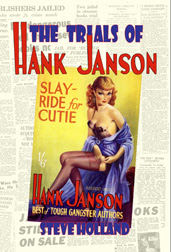Maydwell was the author of nine books published in a series launched shortly before the start of the Second World War. In 1939 the publisher debuted the Mellifont Sports Series of 128-page novels and occasional non-fiction. The series included some regulars from boys' papers, including John Hunter, John G. Rowe, Peter W. Batten and Charles E. Pearce, and probably most notably, John Creasey. In all, the series published some 45 books, so Maydwell's nine made up a substantial percentage of the output in 1940-41.
At least one of the novels had made a prior appearance as a magazine serial: "The Football Racket" had appeared in D. C. Thomson's sporting paper Topical Times in 1939 ahead of its Mellifont appearance in 1940.
I also believe he wrote for Piccadilly Novels as William Darrell, two novels appearing in 1940-41.
Other than these hard-to-find books, there was no other known information about Maydwell until a recent bit of research by John Herrington brought some potentially interesting information to light. Firstly, it appeared that in around 1945, Maydwell was referred in a newspaper article as a local journalist. The piece, in the Plymouth Western Morning News, concerned an address made by Maydwell to the Torquay Overseas League at the opening of their winter session in October 1945.
The Portsmouth Evening News had carried a couple of sporting reports on the subject of rugby in 1938-39, and the Gloucester Citizen had carried a piece on cricket around the same time. In 1945, Maydwell was a witness in a libel case against the Torquay Times and South Devon Advertiser where he was described as the chief reporter of the Torquay Times and Directory.
This led to a possible sighting of Maydwell in official records as the death of a William D. Maydwell, aged 58, was recorded in 2Q 1950 in Newton Abbot, Devon. He would have had to have been born in 1891 or 1892, but there is no sign of a birth under that name.
Maydwell had probably been living in Newton Abbot since at least the end of the Second World War, since there was a record of his marriage to Grace M. Clark (or Maydwell) in that district in 3Q 1945. Grace Mary Maydwell, born in 1901, died in 2Q 1970 in Torbay, Devon.
This was not, it would seem, his first marriage as there was an earlier record of a marriage in St. Giles, London, between Maydwell and Flora A. Croft in 1917. The marriage did not last, ending in divorce in November 1922. Flora Alice Maydwell later lived in Paddington in the late 1920s and subsequently married in St. Nazaire, France, in the early 1930s.
This is all rather less than illuminating and it is only now that things start to get interesting. The National Archives has a record dating from 1914 of a Consular court case held in Cairo, Egypt: Duncan Silvestro Rabagliati v H. E. Wortham & W. D. Maydwell. A second case followed in 1916: Anglo- Egyptian Bank Ltd. v. W. D. Maydwell.
Although these are public records (FO 841/143, FO 841/156), I've not had a chance to examine them; presumably they were not so bad as Maydwell was shortly after back in the UK and subsequently served in France with the Royal Army Medical Corps. On 23 December 1917 he transferred to the Labour Corps and, the following day, was promoted to temporary 2nd Lieutenant. He was later promoted to the rank of Captain.
According to Maydwell's army records, he was on "Suspense List/68", which relates to the Suspension of Sentences Act, 1915 under which (and I'm indebted to a reply from Alan Greveson in this forum), under which: sentences of imprisonment or penal servitude in the field were subject to review to prevent trained soldiers from languishing in prison, but also to allow a soldier under sentence to redeem his character by a period of good conduct (or "conveniently" getting shot).
Perhaps his appearance on the Suspense List (which would have almost certainly meant forfeiting any service medals) was somehow related to his court cases in Egypt... it seems unlikely that it was the cause of his transfer from R.A.M.C. to Labour Corps as he was immediately promoted in rank.
Maydwell's next known appearance was before a judge at the Central Criminal Court, where he was sentenced on 11 May 1920 to nine months for stealing a diamond ring valued at £60. At the time, Maydwell was living in a flat in Jermyn Street and was engaged to a Mrs. Mary Perkins, a divorcee who lived in Kensington. During a visit, Maydwell had remarked that her ring needed cleaning and that he knew a shop in Bond Street where it could be done. Two days later, Maydwell told her that the ring would be posted on the next day by the shop. When the ring did not arrive, Mrs. Perkins visited Maydwell's flat only to find him out. Looking around for something with which to write a note, she discovered a pawnbroker's ticket in a drawer in respect of her ring made out for £30 in the name of Captain W. Maydwell. Mrs. Perkins took the ticket to the police. A later report noted: William Darrell Maydwell, 31, was sentenced to nine months' imprisonment with hard labout on an indictment charging him with stealing a diamond ring and brooch, and converting to his own use a diamond and emerald ring and a diamond pendant which had been entrusted to him for valuation and resetting. (The Times, 12 May 1920)He was back in court a year later, arrested in April 1921 after having fraudulently obtaining a meal on credit. Described as a waiter he gave the name Captain Stanley when charged and claimed ethat he was "broke and hungry and had to get food somehow." The meal, at Frascati's Restaurant in Oxford Street, London, consisted of Soup, 2s.; fish, 5s.; vegetables, 2s.3d.; chocolate, 6d.; coffee, 6d.; wines, 5s., spirits, 8s. 4d.; liqueurs, 10s.; cigars, 4s.; cigarettes, 3s.; minerals, 1s; total, £2. 6s. 9d.Charged at Marlborough Street on 23 April 1921, the prisoner was held on remand under the name Henry Edward Stanton as the police had reason to believe there would be other cases to inquire into. When his case came up at the Old Bailey in May 1921, Stanton—described as "a well-dressed man of 29—admitted 17 cases of obtaining meals and goods by false pretences. Chiefly, the prosecutor, Mr. Travers Humphreys, drew attention to a £250 cheque he gave to Harrod's banking department on 8 April. Told that it would take several days for the cheque to clear, Stanton, using the name Major A. G. Stanton of Park Mansions, said this was awkward as he wanted a few things for the week-end. He was allowed to open a credit account, through which he immediately ordered cigars, cigarettes, tobacco, a cigarette case and a gold wristlet watch and had them sent to his flat. He waiting outside the Mansions until the goods were delivered and took them from the delivery van. Within a few days he pawned the cigarette case. He also stole a cheque book from Mr. Robert Downs at a Turkish baths and, by means of worthless cheques, obtained clothes from Burberry's. A detective gave evidence that there were seventeen other charges against the prisoner in various parts of the country, and at least three warrants out against him. In evidence, the police said that the prisoner was not a major, but his real name was unknown. It was known that he had been sentenced a year earlier to nine months with hard labour. This time, the judge sentenced him to eighteen months' hard labour. Released the following year, Maydwell was almost immediately in trouble again: in November 1922, the Recorder at the Old Bailey remarked that he had never seen an educated man descend so low, as he sentenced Maydwell under the name William Henderson to three years' penal servitude for cheque frauds and luggage thefts from railway stations. "Henderson", under which name he was tried, had obtained a book with 12 cheques, the property of N. H. R. Dade, using which he had obtained credit from Romanos restaurant to the value of £2. 16s. 11d. He had attempted to similarly defraud the Army & Navy Co-operative Society of £2 9s. Other charges concerned the stealing of suitcases and other articles from Great Western Railway and The Midland Railway. A little of Maydwell's background was revealed during the case: it was said that he had been well educated at a public school but had been prevented from going to university by the death of his father. Before the war he had been a journalist in Alexandria and in the R.A.M.C. during the war he had obtained the rank of Captain. Since the war he had separated from his wife, and had been sentenced to nine months for stealing the jewellery of a woman with whom he was associated. He had pleaded guilty of almost all of the charges and sentenced; the three sentences, each of three years, were to run concurrently. He was released on 13 February 1925. Maydwell—or Stanton... or Henderson—then disappears until the first sighting of him as a south coast journalist in 1938. Given that his birth year is known approximately—Stanton was 29 in 1921 and Henderson 30 in 1922—his birth in around 1891 or 1892 is fairly firmly established; the death of William D. Maydwell in 1950 at the age of 58 also ties in with this date. The two most frustrating aspects of this rather patchy story is that we still don't know for sure that William Darrell Maydwell was his real name: there's no record of anyone being born under that name in 1891/92. |
There was a Henry Edward Stanton born around that time who, at the age of 24, enlisted in the 4th Battalion, Worcestershire Regiment. This Stanton had married Fanny Frances Entwistle two days before Christmas in 1914 and had a son, John Henry Stanton by the time he signed up in 1915. A former baker, Stanton served in India and South Africa for 3 1/2 years before being discharged with the rank of L/Cpl. This Stanton would appear to have continued living in Worcester after the war, and indeed the next war, as that was where his death was registered in 2Q 1965, aged 74. He's clearly not our man.
The second frustration is that extended gap between around 1924, when he was probably released from jail, and 1938, when he turns up as a sports journalist and novelist. Could he have been working under other names or anonymously during that period?
PUBLICATIONS
Novels
The Russian Heavyweight. London, Mellifont Press [Sports Series 23], 1940.
Between the Posts. London, Mellifont Press [Sports Series 26], 1940.
The Greyhound Murder Mystery. London, Mellifont Press [Sports Series 28], 1940.
The Dart Board Mystery. London, Mellifont Press [Sports Series 31], 1940.
The Football Pools Mystery. London, Mellifont Press [Sports Series], 1940.
The Football Racket. London, Mellifont Press [Sports Series], 1940.
The Soccer League Heavyweight. London, Mellifont Press [Sports Series 35], 1941.
Convict International. London, Mellifont Press [Sports Series 38], 1941.
Death in the Tote Box. London, Mellifont Press [Sports Series], 1941.
Novels as William Darrell
The Shadow of the Gestapo. London, Fiction House [Piccadilly Novels 171], 1940.
Compulsary Gangster. London, Fiction House [Piccadilly Novels 185], Dec 1941.
Non-fiction
Visitor's Guide to Paignton. 1948.
























































A message for Evelyn: Thanks for your e-mail. I've tried replying, but each time all I've received is a "Mail delivery failed" notice. I'll keep trying, but if you have another address, perhaps you could drop me a line.
ReplyDelete